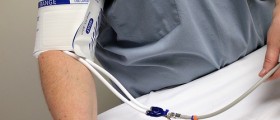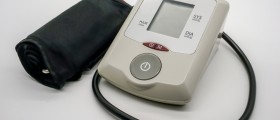
Measuring your blood pressure (BP) you will get two numbers. The higher number is systolic blood pressure, measured when the heart pumps the blood and it represents the pressure on the arteries of the heart. The lower number is known as diastolic blood pressure. This is the pressure which exerts on the arterial walls when the heart is in the resting phase, between the two heartbeats.
Normal blood pressure is usually somewhere around 120/80mm Hg (millimeters of mercury column, since these are the units for measuring the blood pressure). Patients whose systolic BP is in the range from 120 to 139mm Hg and diastolic BP about 80 to 89mm Hg are commonly diagnosed to suffer from pre-hypertension. A person with blood pressure over 140/90mm Hg is diagnosed to be hypertensive or to have high blood pressure.
Is Hypertension Common?
Yes, heightened blood pressure is very common medical problem and according to statistics, there are over 65 million people in the United States suffering from this disease. There is no one who can’t develop this problem, regardless the age, gender, race or ethnicity, because hypertension may affect literary anyone. However, up to the age of 55, men are more likely to develop hypertension, while in the age group 75 and over, women are found out to be more prone to this problem.
Overweight, obesity, patients with coronary artery disease or some kidney problems, as well as people of African, Cuban, Puerto Rican or Mexican origin are considered high risk groups, when it comes to high blood pressure.
Symptoms and Health Consequences
High blood pressure is usually not associated with any symptoms and patients usually don’t know they have any problem at all until they discover they are suffering from hypertension, during some regular checkup. Some patients might notice headaches or dizziness. Although asymptomatic, high blood pressure is not naive and shouldn't be taken lightly. This disease is associated with many health problems and can contribute to development of serious diseases such as heart failure and heart attack, kidney diseases and stroke. Hypertension is also considered to be the silent killer, linked to thousands of deaths every year.
How to Prevent Hypertension?
To prevent high blood pressure change your lifestyle. Lose excess weight, maintain some healthy diet and eat less salt. Eat more fruits, vegetables, low fat milk and dairy products, whole grains, fish, poultry and nuts, but avoid sugar, saturated fats and red meats. Regular exercise is also proven to be beneficial, as well as limitation of alcohol intake to one or two drinks per day.

















Your thoughts on this
Loading...